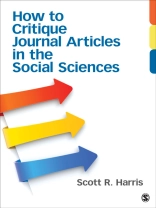This brief, introductory book provides readers with a step-by-step guide to reading and understanding a social science research article. The author demonstrates the many strengths of social research, including its advantages over ordinary ways of knowing things, and, at the same time, points out that research is inevitably flawed. Rather than naively assuming that good research simply produces ‘The Truth’ or cynically asserting that research is hopelessly biased and futile, this book instills in readers a critical perspective—one that appreciates the strengths and weaknesses of any piece of scholarship.
Inhoudsopgave
1. Social Research vs. Ordinary Ways of Knowing
2. What is a Journal Article?
3. Defining Key Terms
4. Literature Reviews
5. Measurement
6. Sampling
7. Analysis
8. Ethics
9. Politics
10. Why Read Journal Articles—And Think Critically about Them?
Over de auteur
Scott R. Harris (Ph.D., University of Oregon) is Professor of Sociology at Saint Louis University, where he teaches courses on Emotions, Family, Research Methods, Social Psychology, and Contemporary Theory. He is the author of two books on conceptualization and measurement: What Is Constructionism? (which received the Cooley Award from the Society for the Study of Symbolic Interaction) and The Meanings of Marital Equality. He also co-edited Making Sense of Social Problems (with Joel Best) and co-authored Stargazing: Celebrity, Fame, and Social Interaction (with Kerry Ferris). He has reviewed articles for numerous journals and edited a special issue of the Journal of Contemporary Ethnography. Currently he serves as Editor-in-Chief of the journal Sociology Compass.












